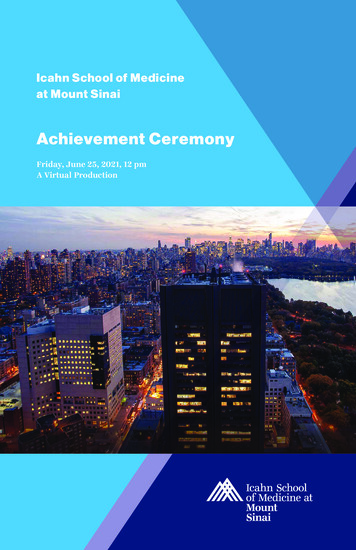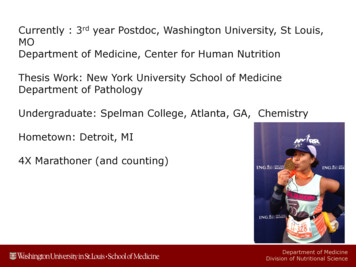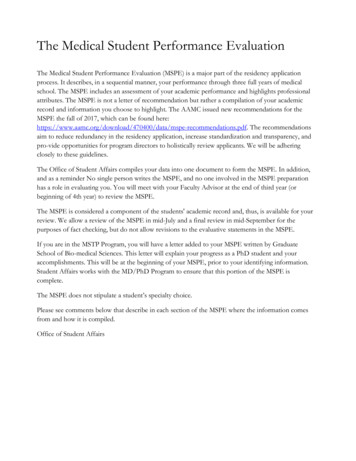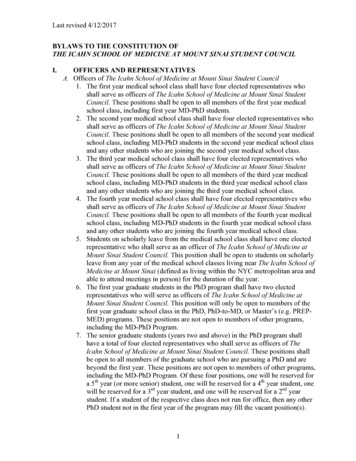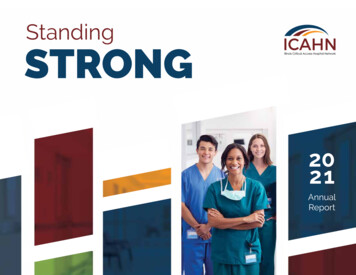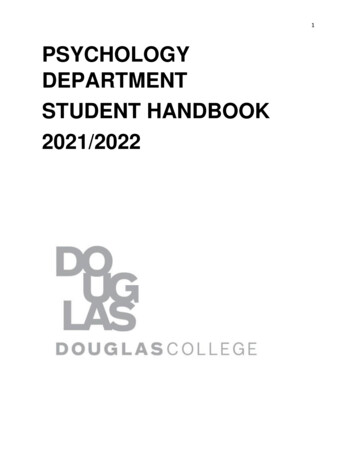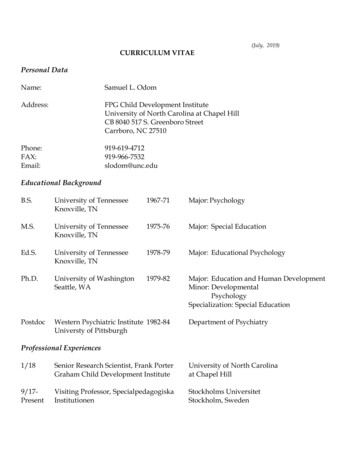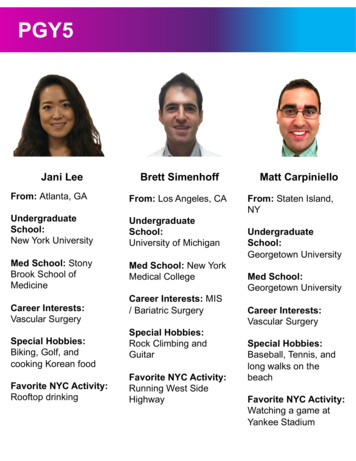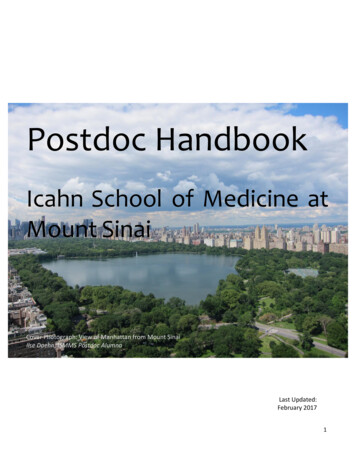
Transcription
Postdoc HandbookIcahn School of Medicine atMount SinaiCover Photograph: View of Manhattan from Mount SinaiIlse Daehn, ISMMS Postdoc AlumnaLast Updated:February 20171
Table of Contents1. Welcome .52. Mission of the Office of Postdoctoral Affairs (OPA). 63. Who we are . 64. How to find us . 65. Appointment . 7Qualifications to be a Postdoctoral Fellow . 7Term of Appointment .7Guideline for implementation of 5-year term. 7Overview . 8I. Implementation Guidelines for the 5-Year Term . 8II. Extenuating Circumstances and Exceptions to the 5-Year Term . 9III. Procedure to Request an Exception to the 5-Year Term. 9Onboarding and orientation process . 10A Postdoctoral Fellow’s Rights and Responsibilities . 106. Financial Support . 11Stipends . 117. Policies and Procedures . 12Vacation Days . 12Holidays . 12Sick Days . 12Leave of Absence . 12A. Overview . 12B. Types of Leave . 14Transfers . 14Termination. 14Foreign Nationals. 158. Postdoc Services. 16International Personnel . 16Benefits . 17Health Services . 17Employee Assistance Program and Mental Health Program . 17Postdoc Listservs . 17Office of Career Services & Strategy (OCSS) .18Conflict Resolution . 18Additional Conflict Resolution Resources . 18LGBTQ Resources . 19Diversity Resources . 21ISMMS Diversity Programs and Resources . 212
Mount Sinai Health System resources . 229. Institutional Services . 23Grants and Contracts (GCO) . 23Institutional Animal Care and Use Committee (IACUC) . 23Program for the Protection of Human Subjects (PPHS) . 23Computer Services . 23Levy Library . 23Mount Sinai Innovation Partners (MSIP) . 24Institutional Biosafety Program:. 24Deans’ COREs . 2410. Responsible Conduct in Research (RCR). 24Guidelines for Handling Misconduct in Research . 251. Introduction . 252. Definitions . 253. Responsibilities. 254. Procedures for Handling Allegations of Misconduct in Research .2611. Awards and Honors . 30Robin Chemers Neustein Postdoctoral Fellowship . 30Travel Awards. 30Graduate School Spring Ceremony Awards . 30Career Development Awards . 3112. Postdoc Life. 31At Work: Professional Resources . 31Postdoc Advisory Committee. 31Postdoc Executive Committee (PEC) . 31Postdoc Housing Committee. 31Postdoc Writing Group . 31Mount Sinai Science Policy Group (MSSPG) . 31Future Leaders in Science Education and Communication Training Program . 32Future Leaders in Project Management . 32Postdoc Periodical.32Postdoc Alumni .32Career Development Seminars and Workshops . 32Annual Postdoc Symposium . 32Postdoc Socials.33Quality of Life: Supporting Resources . 33ISMMS Housing . 33Resource Groups.33LGBTQPiM (LGBTQ People in Medicine) . 33Y-Pass . 34Bicycles. 34Child Care . 343
Lactation Room . 34Buses – Shuttle Service . 34Food Service . 34Lost and Found . 35Parking . 35Recreation Office . 35Security Department.35Banking . 35Business Cards and Professional Portraits . 3613. Institutional PoliciesC-14 Training and Certification .36Affirmative Action Policy (June 2011) . 37Policy Addressing Mistreatment & Unprofessional Behavior Directed at Students & Trainees . . 37Statement of Purpose .37Policy . 38Procedure . 40Resources for Seeking Guidance or Reporting . 42Protection from Retaliation and Contact Information . 42Appendix. 43Code of conduct for postdoctoral trainees and their mentors . 43Core Principles of Postdoctoral Training. 43Commitments of Postdoctoral Trainee. 44Commitments of Mentor(s) . 45International Postdoc Teaching Policy . 484
1. WelcomeWelcome to the Icahn School of Medicine at Mount Sinai (ISMMS).The Postdoctoral Handbook was created specifically for postdoctoral fellows as a resource for informationon important topics such as recruitment and termination policies, vacation days, conflict resolution, andprocedures for grant submissions.As a postdoctoral fellow, you will play a critical role in generating and fostering a cutting-edge, interdisciplinaryresearch environment that serves to advance medical knowledge daily. Excellence in research, education, andpatient care form the foundation that makes Icahn School of Medicine at Mount Sinai in New York City a worldrenowned center for medical and scientific training.Mount Sinai’s education philosophy reflects the ever-changing face of contemporary science, and the mostimportant thing a postdoctoral fellow can learn is how to continue learning.Postdoctoral fellows gain research experience by working side-by-side with world-renowned physicians andscientists who are answering fundamental questions related to human conditions, disorders, and disease. TheGraduate School, Medical School, and Hospital are interlaced physically, making Mount Sinai a uniqueenvironment for postdoctoral fellows to have a truly translational education. Laboratories often traingraduate students, medical students, postdoctoral fellows, and clinical fellows simultaneously, facilitating therapid transfer of research developments to patient care and clinical insights back to the bench for furtherinvestigation.Disclaimer: This Handbook is subject to change at Mount Sinai’s discretion and does not constitute a contract.5
2. Mission of the Office of Postdoctoral Affairs (OPA)The Office of Postdoctoral Affairs was established February 1, 2000 to serve as a dedicated resource forpostdoctoral fellows, faculty, and administrators. It is located within and supported by the Graduate School ofBiological Sciences. The Office works to support and enhance the outstanding scientific training available to allpostdoctoral fellows. The Office is also responsible for processing the recruitment and termination ofpostdoctoral fellows and provides a mechanism for conflict resolution if such a need arises.Our primary mission is to maintain a productive and welcoming environment so that postdoctoral fellows canmake the most of their training. Although the onus for career advancement is ultimately on the shoulders ofeach postdoctoral fellow, our mission is to facilitate this responsibility by organizing seminars, workshops andother resources that provide information for career development, grant writing, communication skills, conflictresolution, and responsible conduct in research. Importantly, the Office of Postdoctoral Affairs provides as anadvocate and voice for all postdoctoral fellows, and creates a sense of family while at Mount Sinai.We also address “quality of life” issues with our services and programs. The Office assists in finding convenient,affordable housing, and aids postdocs experiencing difficulties at work. In addition, the Office encourages andsupports postdoc-initiated activities and endeavors.The ultimate goal of the Office is to provide an excellent supportive environment to engender the best possiblepostdoctoral experience at the Icahn School of Medicine at Mount Sinai.3. Who we areLeadershipThe Office of Postdoctoral Affairs sits within the Graduate School of Biological Sciences and serves under theleadership of the Dean of Basic Sciences and the Graduate School of Biological Sciences. It is managed by a fulltime Program Manager and is overseen by a Faculty Director, a senior member of the faculty of ISMMS. APostdoctoral Advisory Committee, made up of faculty and postdocs, meets monthly. A Postdoctoral ExecutiveCommittee (PEC), led by co-chairs that have been elected by their peers, and made up solely of postdocs,meets monthly to organize professional development and community events and advocates for improvementsin postdoc training and quality of life. The PEC reports to the Postdoctoral Advisory Committee to set in courseactions designed to provide training opportunities or improve the quality of life for postdoctoral fellows.Individuals in the positions named and Committee rosters can be found on the website.4. How to find usOffice LocationAnnenberg BuildingRoom 5-206Mailing AddressOffice of Postdoctoral AffairsMount Sinai School of MedicineOne Gustave L. Levy PlaceNew York, NY 100296
Tel: (212) 241-0380Fax: (212) 876-4978e-mail: theresa.scarabino@mssm.eduwebsite: http://icahn.mssm.edu/education/postdoc5. AppointmentQualifications to be a Postdoctoral FellowAppointment as a postdoctoral fellow at ISMMS is extended only to individuals with doctoral degreeswho seek to enhance their research experience under the mentorship of a faculty member (PrincipalInvestigator, PI). This is a “trainee” position, and is not a faculty position.It is the responsibility of the postdoctoral fellow to provide original transcripts and documentation that certifythat his/her advanced degree has been received, and it is the responsibility of the principal investigator (PI) toconfirm that the documentation is satisfactory. In the event that an advanced degree has not yet beenawarded, a letter from the granting institution certifying that all requirements for the degree have beenfulfilled can be substituted. A copy of these documents will be maintained with a copy of the letter ofappointment in the postdoctoral fellow’s file in the Office of Postdoctoral Affairs. An individual cannot beappointed as a postdoctoral fellow if this documentation has not been presented to the Office. In the event thepostdoctoral fellow will be sponsored on a visa, the documentation provided must satisfy federal regulations.Term of AppointmentPostdoctoral candidates are appointed for terms not to exceed five years, but initial appointment terms fora postdoctoral fellow can be made for shorter terms (one to two years) at the discretion of the PI. A letterof appointment signed by the PI should state the initial term of appointment, specifying the five-year limit,and stipend, which is regular pay similar to a salary, but reflects the temporary nature of postdoctoral training.Since postdoctoral fellows work with particular PIs, such PIs have the responsibility to evaluate them ontheir progress, and will make decisions regarding the duration of the total training period.Guideline for implementation of 5-year termAs per recommendations of the National Academy of Sciences (NAS), the Icahn School of Medicine atMount Sinai (ISMMS) has implemented a policy that the postdoctoral training period should be limited tofive (5) years. The guidelines are also available online at the link .p df.The goal of this policy is to support the timely and successful transition of postdoctoral fellows (postdocs)to the next stage of their careers. The purpose of the guidelines herein is to provide transparency for allISMMS postdocs and PIs regarding the rules and appeal procedures for the five-year limit. Theseguidelines were developed through the collaborative efforts of the PEC, the Office of PostdoctoralAffairs, and the Postdoctoral Advisory Committee, referred to as ‘The Committee’ herein.7
OverviewAs of March 15, 2016, all incoming ISMMS postdocs must adhere to the five-year limit. The Committeerecognizes that implementation of this policy will require a transition period. At the onset ofimplementation of this policy, March 15, 2016, a two-year grace period will apply to all existing postdocsthat have over three (3) years’ experience at ISMMS. For example, a postdoc who has completed 4 yearsthat ISMMS as of March 15 2016, will receive an extension for a total term not exceeding 6 years. Thegrace period will allow postdocs sufficient time to plan for the next step in their careers followingimplementation of the limit. Postdocs at ISMMS for a total of three (3) years or fewer as of March 15,2016 will be expected to adhere to the five-year limit. Specific guidelines for PIs, postdocs, the OPA, andthe Office of Career Services and Strategy (OCSS) to ensure successful implementation of this rule appearbelow. The procedure for a postdoc to apply for an extension to the five-year limit is also detailed below,should cases of genuine need arise.I. Implementation Guidelines for the 5-Year TermPrincipal InvestigatorsIn their employment offer letter, Principal Investigators (PIs) must clearly state the initial term ofappointment and length of current funding support. The ISMMS five-year limit policy must be made clearto incoming postdocs in their offer letter. The five-year term includes years spent as a postdoc in anylaboratory at ISMMS but not those at previous institutions. The PI must perform an annual evaluationwith any postdocs under her/his mentorship and complete an individual development plan (IDP) toformalize a concrete plan for transition at the end of the five-year period. As part of the annualevaluation, PIs should ensure that postdocs are taking appropriate steps to seek training and careerdevelopment opportunities available at ISMMS and beyond.At the end of five years, all ISMMS postdocs will have reached the end of their postdoctoral fellow term. If,however, the postdoc is eligible for a legitimate extension (Section II), the postdoc must formally apply tothe OPA as outlined below (Section III). Internal promotion at the end of the term (e.g., to Instructor orAssistant Professor) is only one of many career options, and is not guaranteed. An instructor/staff scientistposition is a research path that is not a training position (as is a postdoctoral fellow). Currently, no formalpolicies for instructor salary rates or benefits exist at ISMMS. When considering promotion, a postdocshould educate her/himself about the fair market rate for salary and benefits for this level of employmentat ISMMS and at other institutions so as to be prepared to negotiate an appropriate compensationpackage as well as full employee benefits (e.g. a benefits package that is matched by the institution).Many sources of information are available including the Office of Academic Development andEnrichment and departmental administrators.Postdoctoral FellowA postdoc with more than three years’ experience at ISMMS on March 15, 2016 must be allowed time toplan for the next step in her/his career following implementation of the limit. All postdocs who havebeen at ISMMS for three years or longer will be given a two-year grace period, beginning in March 2016.During their first three years, Postdoctoral trainees should seek ISMMS training and career developmentopportunities that are offered on a regular basis and free of charge. A list of these opportunities isavailable on the Office of Postdoctoral Affairs (OPA) website, as well as in regularly advertised events bythe Graduate School of Biological Sciences. Consistent with stated NIH policy, postdoctoral traineesengaged in research, while not generally pursuing an additional degree, are expected to be activelyengaged in their training and career development under their research appointments as postdocs. This is8
critical in order to provide postdoctoral trainees with sufficient experience and mentoring for them tosuccessfully pursue independent careers in research and related fields. To that end, the postdoc code ofconduct states that all ISMMS postdocs are entitled to protected time for such activities (see Appendix).While ISMMS recognizes that time devoted to each postdoctoral trainee’s career and professionaldevelopment activity will vary, such protected time is indicated by NIH policy. The OPA and the GraduateSchool of Biological Sciences recommends that postdocs seek career development activities, including butnot limited to obtaining a secondary mentor (independently or through the formal ISMMS SecondaryMentoring program), professional networking, self-skill assessment, obtaining objective independentreviews of career progress, and participating in professional conferences.Office of Postdoctoral AffairsTwo years before a postdoc approaches the five-year limit (e.g., at the beginning of the 3rd year oftraining), the OPA will contact the postdoc, PI(s), and department administrator. The postdoc isencouraged to set up career-planning meetings with the PI, secondary mentor. Postdocs for whom thetwo-year grace period applies (those at ISMMS longer than three years as of March 15, 2016) will becontacted in March 2016, and must initiate career-planning to prepare for transition by March 2018.The OPA will provide information from the OCSS about this transition. The postdoc will receive a list ofmilestones for planning and executing a plan for promotion or employment outside of ISMMS from theOCSS. Included in these milestones is the institutional requirement that PIs and fellows must meet aspart of the annual evaluation and complete an individual development plan (IDP) to formalize a concreteplan for the postdoc’s transition.The OPA is the first point of contact for any questions relating to the five-year limit and itsimplementation.Office of Career Services & StrategyThe Graduate School’s Office of Career Services & Strategy ( OCSS) has developed a robust set ofresources to assist fellows in developing their career options; the availability of these resources will beregularly conveyed to the fellows as the term-limit approaches. The director of career services is EllieSchmelzer, PhD, and all OCSS services and contact information can be found ice-career-services.II. Extenuating Circumstances and Exceptions to the 5-Year TermThe Committee recognizes that there may be cases that require an extension to this five-year limit. Casesrequiring extensions include,
patient care form the foundation that makes Icahn School of Medicine at Mount Sinai in New York City a world- renowned center for medical and scientific training. Mount Sinai's education philosophy reflects the everchanging face of contemporary science, and the most - important thing a postdoctoral fellow can learn is how to continue learning.
